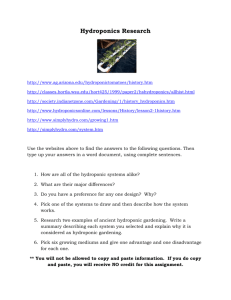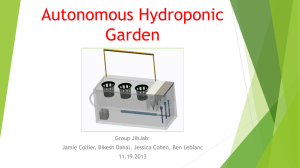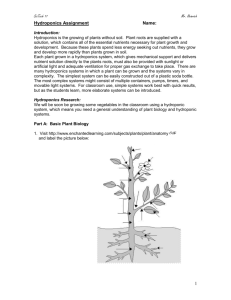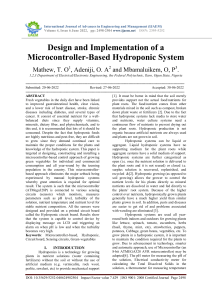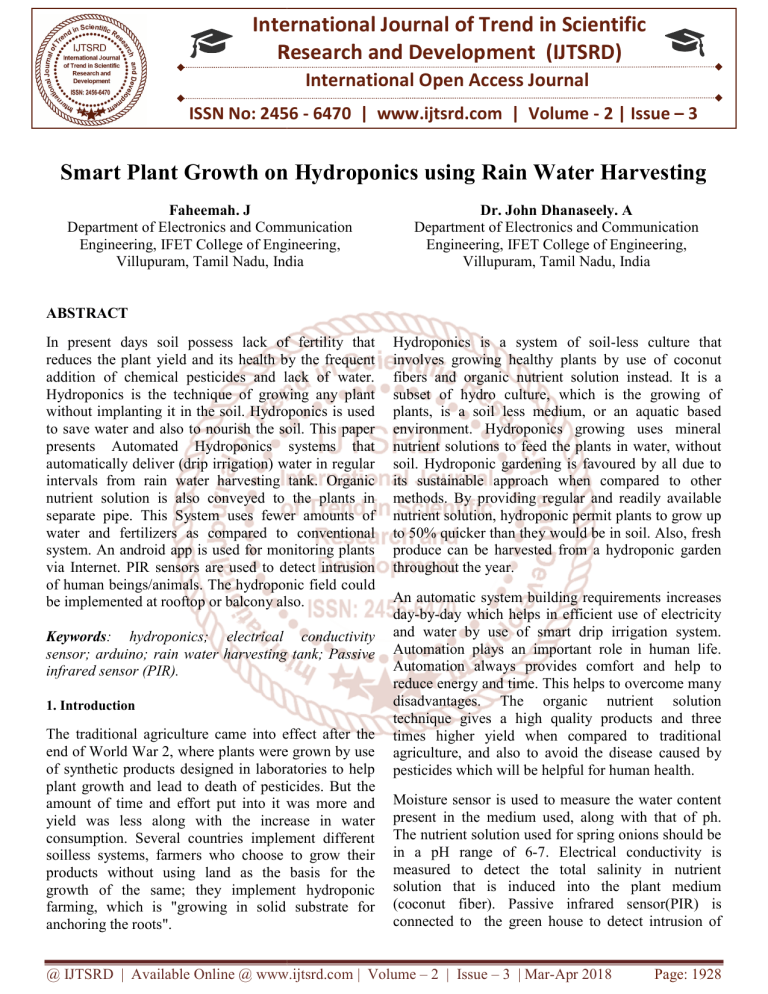
International Journal of Trend in Scientific Research and Development (IJTSRD) International Open Access Journal ISSN No: 2456 - 6470 | www.ijtsrd.com | Volume - 2 | Issue – 3 Smart Plant Growth on n Hydroponics using sing Rain Water Harvesting Faheemah. J Department of Electronics and Communication Engineering, IFET College of Engineering Engineering, Villupuram, Tamil Nadu, India Dr. John Dhanaseely. A Department of Electronics and Communication Engineering, IFET College of Engineering, Engineering Villupuram, Tamil Nadu, Nadu India ABSTRACT In present days soil possess lack of fertility that reduces the plant yield and its health by the frequent addition of chemical pesticides and lack of water. Hydroponics is the technique of growing any plant without implanting it in the soil. Hydroponics is used to save ave water and also to nourish the soil. This paper presents Automated Hydroponics systems that automatically deliver (drip irrigation) water in regular intervals from rain water harvesting tank. Organic nutrient solution is also conveyed to the plants in separate eparate pipe. This System uses fewer amounts of water and fertilizers as compared to conventional system. An android app is used for monitoring plants via Internet. PIR sensors are used to detect intrusion of human beings/animals. The hydroponic field coul could be implemented at rooftop or balcony also. Keywords: hydroponics; electrical conductivity sensor; arduino; rain water harvesting tank; Passive infrared sensor (PIR). 1. Introduction The traditional agriculture came into effect after the end of World War 2, where plants were grown by use of synthetic products designed in laboratories to help plant growth and lead to death of pesticides. But the amount of time and effort put into it was more and yield was less along with the increase in water consumption. Several countries implement different soilless systems, farmers who choose to grow their products without using land as the basis for the growth of the same; they implement hydroponic farming, arming, which is "growing in solid substrate for anchoring the roots". Hydroponics is a system of soil-less soil culture that involves growing healthy plants by use of coconut fibers and organic nutrient solution instead. It is a subset of hydro dro culture, which is the growing of plants, is a soil less medium, or an aquatic based environment. Hydroponics growing uses mineral nutrient solutions to feed the plants in water, without soil. Hydroponic gardening is favoured by all due to its sustainable le approach when compared to other methods. By providing regular and readily available nutrient solution, hydroponic permit plants to grow up to 50% quicker than they would be in soil. Also, fresh produce can be harvested from a hydroponic garden throughout the year. An automatic system building requirements increases day-by-day day which helps in efficient use of electricity and water by use of smart drip irrigation system. Automation plays an important role in human life. Automation always provides comfort and an help to reduce energy and time. This helps to overcome many disadvantages. The organic nutrient solution technique gives a high quality products and three times higher yield when compared to traditional agriculture, and also to avoid the disease caused by b pesticides which will be helpful for human health. Moisture sensor is used to measure the water content present in the medium used, along with that of ph. The nutrient solution used for spring onions should be in a pH range of 6-7.. Electrical conductivity is measured to detect the total salinity in nutrient solution that is induced into the plant medium (coconut fiber). Passive infrared sensor(PIR) is connected to the green house to detect intrusion of @ IJTSRD | Available Online @ www.ijtsrd.com | Volume – 2 | Issue – 3 | Mar-Apr Apr 2018 Page: 1928 International Journal of Trend in Scientific Research and Development (IJTSRD) ISSN: 2456-6470 2456 animals or other human beings. Here, separate rain water harvesting tank is used during summer to help with the scarcity of water where the droplets of rain water are stored. 2. System design: This design describes the detailed implementation of a controlled system of automatic drip irrigation and continuous monitoring of physical variables involved in spring onions. The physical variables like PH, temperature and electrical conductivity of the soil is measured. The block diagram of the proposed system consists of the sensing and controlling units is shown figure 1. Fig. 11. Block diagram of proposed system 3. Proposed system: This section deals with the methodology of the proposed system. The plant grown using this hydroponic system is onions. The most important aspect is rain water harvesting. For this purpose, we are collecting rain water in a rain water harvesting tank that is being constructed near the hydroponic setup. The water level in rainwater harvesting tank is continuously monitored by the comparator. When the water level increases and reaches the expected level in the tank, there occurs a voltage drop which in turn sends ends a signal to the arduino board that switches on to the fixed to a well/tank. Likewise when the water level decreases then the water is taken from the motor. An android app is installed to monitor and control the flow of water. First the water flow in drops rops is fixed to 3 drops for one minute. During peak summer hours the water drops can be changed from 3 to 5 drops for one minute using the app from anywhere by the farmer. This will reduce the manual monitoring and controlling of water flow to the field. fiel The type of irrigation used is drip irrigation where the plants are watered in periodic cycles along with the organic nutrient solution. The moisture and alkalinity is determined by the usage of ph level and electrical conductivity sensors. The PIR sensors sens sense the motion of animals and burglar alarm starts to ring and make the farmer alert. To reduce the use of pesticides that harm the plants, we prepare our own nutrient solution for this system. @ IJTSRD | Available Online @ www.ijtsrd.com | Volume – 2 | Issue – 3 | Mar-Apr Apr 2018 Page: 1929 International Journal of Trend in Scientific Research and Development (IJTSRD) ISSN: 2456-6470 2456 4. Hardware Description: 4.2. Sensor: The connections available in the project are explained below. Arduino is the controller of the project. We have two comparator circuits, one is connected to the soil moisture and conductivity sensor and other is used to compare the water level in the well and the rain water harvesting tank. A power supply of 5v is what the voltage given to the arduino board. A Sensor is an n electronic device used to detects and generate signals as a form of input from its surroundings.. The specific input could be light, temperature,, motion, moisture, pressure, or any one of a great number of other environmental phenomena. phenomena It converts the physical parameters (temperature, humidity, etc) into a signal which can be measured electrically.. Sensors are used in daily objects such as touch-sensitive sensitive elevator buttons and lamps which weak or brighten.. The sensitivity of the sensor is used to measure the variations in the generated output with respect to the measured input.. The assembly of sensor is shown below: 4.1. Arduino The arduino Uno is a microcontroller board based on the ATmega328. It consists of 14 digits input/output pins, (i.e.) 6 analog inputs, 8 analog outputs, a ceramic resonator with a range of 16MHZ 16MHZ, a USB connection, a power jack and a reset button. The arduino UNO can be powered via the USB link or with an exterior power supply. The power source is selected automatically. Arduino is one that is an established open source computer hardwar hardware and software company and user community that is used for manufacture andd design of single single-board microcontroller troller and microcontroller kit to build digital and interactive objects for sensing and controlling ling objects in real time applications applications. Fig. 3. Assembly of Sensor 4.3 Comparator: A comparator circuit compares two voltages and outputs either a 1 or a 0 to indicate which is large. Comparators are used to compare the input value with a fixed/constant value. In most cases a comparator is implemented using ng a dedicated comparator IC, but op-amps amps may be used as an alternative. Comparator diagrams and op-amp amp diagram use the same symbols. 5. Conclusion: Fig. 2. Assembly of Arduino UNO board The proposed system produce high quantity of yield than that of traditional agriculture in an innovative innov drip irrigation system with rain water harvesting. The entire system is electronically monitored by using Arduino Mega board, PH sensor and an electrical conductivity unit. Healthy plants are grown by using the home-produced nutrient solution. This system s showed the live streaming of crops using android phones and automatic comparison of water. In future, it can be used to grow trees and fauna, which serve as a stepping stone to increase of rainfall. The simulation of the project is given below. @ IJTSRD | Available Online @ www.ijtsrd.com | Volume – 2 | Issue – 3 | Mar-Apr Apr 2018 Page: 1930 International Journal of Trend in Scientific Research and Development (IJTSRD) ISSN: 2456-6470 Fig 4. Simulation of project. 6. Reference: 1) Victor H. Andaluz, Andrea Y. Tovar, Kevin D. Bedon, Jessica S. Ortiz and Edwin Pruna.: Automatic Control of Drip Irrigation on Hydroponic Agriculture Daniel Tomato Production.: IEEE ICA/ACCA2016, Vol.22, pp. 27-32. CURICO, CHILE, 19-21october 2016. 3) Tomohiro Nishimura, Yuji Okuyama, and A kasha Satoh.: High Accuracy and Low cost Sensor Module for Hydroponic Culture System.: department of communication Engineering and Informatics, The University of Electro Communication, Tokyo, Japan 2016. 2) L.A. Velazquez, M.A.Hernandez, M.Leon .:First Advances on the Development of a Hydroponic System for Cherry Tomato Culture.:10th International conference on Electrical Engineering, Computing science and Automatic Control (CCE) Mexico City, Mexico, September 30 October 4, 2013 4) Bhagayashree K.chatre, Prof J.G.Rana.: Smart Irrigation System using Raspberry PI.: International research journal of Engineering and Technology (IRJET) volume 03(5),2016 5) S.Charumathi, R.M.Kaviya, R.Manisha.: Optimization and Control Of Hydroponics Agriculture using IOT.:Asian Journal of Applied Science and Technology (AJAST) 1(2), 9698(2017). @ IJTSRD | Available Online @ www.ijtsrd.com | Volume – 2 | Issue – 3 | Mar-Apr 2018 Page: 1931
